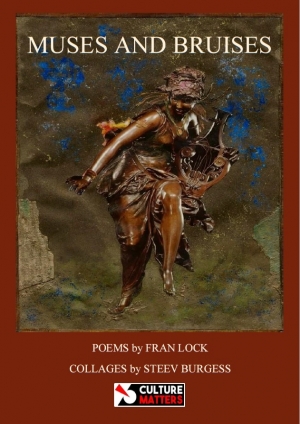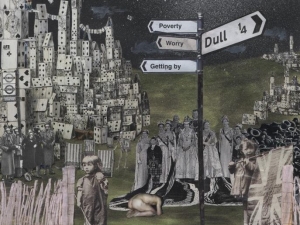
Muses and Bruises
Culture Matters has published a brilliant new collection of poetry called Muses and Bruises by Fran Lock, an activist, writer and illustrator, and one of the finest political poets writing in Britain today. Her feminist and socialist poetry weaves psychological insight and social awareness into themes of poverty, mental health problems, sexual abuse, domestic violence and political struggle. Vivid, lavish and punchy, her writing combines a smouldering sense of anger and injustice with a deeply humane and vulnerable empathy and compassion. The poems are complemented by the collages of Steev Burgess, whose images dance with the poems, deepening their meaning.
The book will be launched at The Duke Pub, 7 Roger Street, London WC1N 2PB on Saturday 14th October at 7.30pm. Have a look at these two fabulous videos made by Fran and Steev to accompany the book.
Our Lady of the Lock - from Muses and Bruises
Rag Town Girls do Poetry - from Muses and Bruises
And here is Fran's Introduction to the collection.
'Most people ignore poetry because most poetry ignores most people.'
- Adrian Mitchell
I've got a lot of love for the late Adrian Mitchell, but I think he was wrong about this. I didn't have much access to poetry growing up, but that wasn't because poetry was ignoring me, that was because poetry had been deliberately engineered out of my life. I had never been told that poetry was for me, that I was allowed poetry, entitled to poetry, deserving of poetry. And no one ever told me how much I needed it, and I did need it, we do need it, all of us.
I came to poetry alone, late, and by chance. My first feeling at having found this beautiful, radiant thing was a mixture of exhilaration and relief, rapidly followed by a massive sense of blind and burning rage that something so essential, so sustaining, something so rich in sweetness and in meaning had been kept from me. I carry that rage with me still.
Poetry does not ignore people, but there is a system at work designed to exclude people from poetry. People like me. People like you. It starts at school, with a hidden curriculum that attempts to circumscribe and to manipulate the cultural expectations and experiences of working-class kids by telling them what is and isn’t for them; what constitutes an appropriate and realistic interest, what counts as a legitimate achievement.
You can't be a poet, people said to me. No, because heaven forfend I should aim so high, heaven forfend I should have such an unrealistic ambition as to acquire language, to articulate and to express myself. No, because if I, as a marginalised or oppressed person, acquire that language, develop that skill, then I am arming myself.
If I am articulate then I cannot be discounted and I will not be ignored. If I have access to the written word, then I am connected to the whole world, I can build movements, I can move mountains, I can understand the nature of that which keeps me down. If I am dexterous with language, then I understand how language is used to ensnare and enslave me. If I understand how language is used then I know when I'm being lied about and when I'm being lied to. If I have poetry, I have a voice, and that voice is a sword and a shield. If I can think for myself, speak for myself, then I can define myself and represent myself. That is a dangerous and wonderful thing.
Better for some if art and culture remain behind high fences in self-policing middle-class enclaves. They'll stuff my head with shit instead, with disposable, sneerable pop and dross. They'll create a climate of bread and circuses. They’ll dehumanise the lumpenproles because all we've got are stunted words for ugly lives – because we're rough, ill-educated, stupid.
We’re not stupid. I love language. I love poetry, all poetry: the Lais of Marie de France, Chaucer, Milton, Blake, Clare, Keats, Yeats, Fiacc, Plath, Brookes, all of it. I reclaim it, I appropriate it, I snatch it back as an act of daily, defiant radicalism. It all belongs to all of us.
And language belongs to us, in all its complexity and richness, in all its rolling, roiling musicality. I was told once that my writing was inauthentic because working-class women don't think or speak that way. Bollocks. I am a working-class woman, and I do write and think and speak this way. There is no one homogeneous working-class voice, any more than there is a single monolithic working-class culture. No one has any right to set limits on the way we sound or the words we use.
The poems in this collection revel in richness and in strangeness, they positively wallow in it. I don't apologise for that. I won’t strenuously enact anybody else’s vision of working-class identity – I assert my right to be lavish, to be complicated. The poems are about beauty and meaning and the unlikely places working-class women and girls find these things, the unlikely materials from which they are composed. Steev's collages bring this to the fore, a mixture of decadence and squalor; grind and grime with a lick of glitter.
Emma Goldman is often misquoted as saying that without dancing it's not her revolution. She didn’t actually say this, but I approve the sentiment, and I'd go further. Without dancing – or poetry – there is no revolution of any description. We first have to recognise our right to joy, to pleasure. Poetry is waiting, go and claim it.
Muses and Bruises is available here.
We're reviewing Culture Matters and would really like some feedback from our readers and supporters. What is your overall impression of the website? How well are we fulfilling our mission of promoting a socialist and progressive approach to the arts and other cultural activities, where culture is organised for the many, not the few? What do you think of the quality and range of the material we publish? Have you considered joining the Culture Matters co-operative? If not, why not?
Click here to do the survey.
Thanks to those who have already responded.


